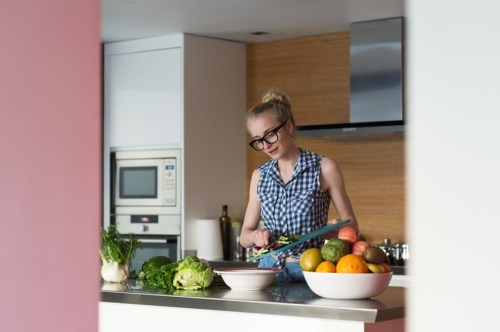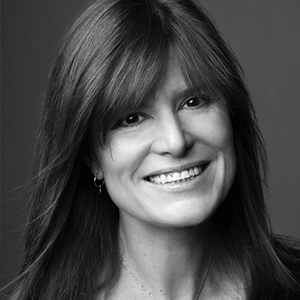Our editors independently select these products. Making a purchase through our links may earn Well+Good a commission
More than half of women have lumpy breasts. Here’s what to do about it
What are fibrocystic breasts? Jill Blakeway, DACM explains what's behind this common condition. She gives advice on changing your diet and other holistic ways to deal with fibrocystic breasts.

Real talk: Some breasts are soft and squishy, while others have a little more texture. So if you’ve ever felt lumps or an overall ropey feeling in your breasts, don’t panic—you might just have fibrocystic breasts. It’s a common condition, but it’s not one you *have* to deal with, says Jill Blakeway, DACM, LAc. After checking with your doctor to rule out anything more serious, you might want to see what this Well+Good Council member has to say about using Chinese medicine to smooth out those bumps.
If you’ve ever noticed a lumpy texture to your breasts and felt concerned, you’re not alone. A little over half of all women between the ages of 20 and 50 report breast tissue that feels ropey or lumpy. In addition to that lumpy feeling, fibrocystic breasts can also make breasts feel tender or painful for at least part of the month, if not more frequently. While these lumps are common, that doesn’t necessarily mean they’re normal. They can be a real indication of an imbalance in hormones in your body.
The good news? It’s treatable. Chinese medicine has been treating lumpy breasts for hundreds of years with good success. The even better news? Some lifestyle and diet adjustments can help you take charge and make change.
Breast pain and lumpiness are often caused by a hormonal imbalance.
Breast pain and lumpiness are often caused by a hormonal imbalance that leads to an excess of estrogen in relation to progesterone. To address this, it’s helpful to reduce your exposure to external sources of estrogen and support your liver (whose job is to process estrogen for you). From a Chinese medicine perspective, this condition is called Liver Qi Stagnation, which is a way of describing an underperforming liver that results in poor circulation and stagnation of blood and lymph in the breasts. Qi stagnation can sometimes be the response to repressed negative emotions such as anger and frustration, so it’s helpful to also explore these emotions as you develop a self-help regimen.
So, the first step toward healthy breast tissue is to reduce your exposure to external sources of estrogen. The second step is to support your liver. The third step is to get your qi moving.
You should always check with your doctor to make sure the lumps you are feeling are benign. If they are, the following three-pronged strategy should help you to reduce any lumps—and, in some cases, can make the lumpiness disappear altogether.
Here’s how Chinese medicine can help minimize the lumps in your breasts.

Limit exposure to external estrogen
Controlling how much estrogen you take can be difficult in our estrogen-laden environment. The problem is that chemical estrogens have ways of entering our food and water supply. For example, agricultural chemicals and pesticides mimic the activity of estrogen, which provokes heightened estrogen receptivity on estrogen receptor sites. Or even urine, contaminated with high levels of residual estrogen from birth control pills, can seep back into water supplies through inadequate sewage treatment procedures.What to do:
- A balanced diet can help regulate estrogen levels. Aim for a whole-foods diet, which is naturally low in trans fats, high in fiber, and consists of mostly vegetables.
- Excess body fat can increase the amount of estrogen in your system. Try to incorporate regular moderate exercise to help to regulate estrogen levels.
- Avoid hormonally treated meat and dairy.
- Eat as much organic produce as you can.
- Avoid refined and hydrogenated oils.
- Eat cruciferous vegetables such as broccoli, cabbage, cauliflower, kale and brussels sprouts. These contain a phytonutrient called diindolylmethane (DIM) which supports the activity of enzymes that improve estrogen metabolism. Scientific research shows DIM increases the level of “good” estrogens (2-hydroxyestrogen) while reducing the level of “bad” estrogens (16-hydroxyestrogen).
Support your liver
One of your liver’s many jobs is to break down estrogens. It has a much harder time doing this if it is detoxifying all the other substances that it is expected to tackle on a daily basis.
What to do:
- Limit alcohol to 3 to 5 drinks a week.
- Avoid coffee.
- To stimulate the liver: try some lemon juice in your water or add some bitter greens (such as dandelion greens, endive, or radicchio) to your next salad.
- You can take liver-supporting herbs including dandelion root, milk thistle, burdock, artichoke, and turmeric.
- B vitamins also aid the liver and are recommended. They can be added in the form of whole foods (such as lentils, rice bran, and blackstrap molasses) or supplements. Vitamin B6, in particular, enhances the breakdown and removal of estrogen from the body.
Move qi in the breast
In Chinese medicine, impeded circulation in the breast can lead to denser and denser tissue over time. Eventually, this can result in fibrocystic breasts.
What to do:
- Apply a castor oil pack to the breast during the five days before your period and during the period itself. Cover the area with castor oil, then place some Saran Wrap on top covered by a clean towel. Heat the area using a heating pack or hot water bottle. (The temperature should be warm, not scalding.) Do this twice a day or when your breasts feel tender.
- Again, regular moderate exercise is the key! Not only does it help to regulate estrogen levels, it also helps improve circulation.
- Regular warm baths can be helpful, especially if you add essential oils such as frankincense and lavender.
- Regular acupuncture can promote blood flow in the breast and help reduce lumps.
Fibrocystic breasts, as I said, are incredibly common. But if you spend a little time and effort on looking after them, you may be able to make them a lot easier to live with.
 Dr. Jill Blakeway, DACM, is a practitioner and teacher of Chinese Medicine and the founder and clinic director of the YinOva Center in New York City.
Dr. Jill Blakeway, DACM, is a practitioner and teacher of Chinese Medicine and the founder and clinic director of the YinOva Center in New York City.
Jill is the author of Making Babies: A Proven 3-Month Program for Maximum Fertility and Sex Again: Recharging Your Libido. She’s currently writing her third book, about energy healing, for Harper Collins.
What should Jill write about next? Send your questions and suggestions to [email protected].
Sign Up for Our Daily Newsletter
Get all the latest in wellness, trends, food, fitness, beauty, and more delivered right to your inbox.
Got it, you've been added to our email list.








